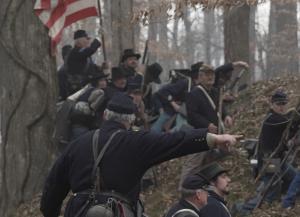South Carolina Businessman Premiers a Civil War Historical Drama Movie
"Sherman's March to the Sea," a 92-minute motion picture is a story based on historical facts, not a documentary.
AUGUSTA, GEORGIA, USA, February 11, 2022 /EINPresswire.com/ -- Walter Czura, a businessman from Hilton Head Island, SC, has stepped into the movie industry by recently premiering a feature length, independent film, "Sherman’s March to the Sea", a historical drama filmed in South Carolina and South Georgia. The legendary Imperial Theatre here in downtown Augusta premiered the motion picture at the Poison Peach Film Festival where it received a warm reception. The film is currently undergoing final editing in preparation to being turned over to a California movie distributor.Czura, who describes himself as a history buff, has had a longstanding business career locally, having founded Marlin Outdoor Advertising more than 40 years ago. Today he is considered one of the most successful billboard entrepreneurs in the Southeast with over 1,000 locations along interstates and highways in both South Carolina and Georgia.
"I'm quite excited about my new venture because of my love of both movies and Civil War history," said Czura. “I’ve been seriously thinking about getting into the film industry for quite some time, so I decided to form a movie company, Fortress Films, and then look for someone who could handle the direction of a film."
Czura selected Augusta native and veteran filmmaker Christopher Forbes to direct the 92-minute movie project, estimated at $1.25 million. Forbes has developed 38 commercial films that have been distributed as direct sale DVDs through chain store outlets or, more recently, via streaming platforms.
"Sherman’s March to the Sea" is a historical drama, not a documentary. Its plot follows the often brutal, month-long military campaign that was conceived by General Sherman to put an end to the Civil War by terrifying the region’s civilian population into abandoning the Confederate cause. Instead it embittered Southerners for generations thereafter.
Czura serves as both executive producer and co-scriptwriter, and after recruiting Forbes, he took on the task of doing all the script research and plot development. The two then collaborated on the final sequencing and script writing while Forbes recruited the actors and other participants needed to make the film come alive.
“I spent several months late at night pouring over historic documents and old books to come up with true-life anecdotes during Sherman’s March that would be compelling for the script,” Czura said. “We then created a series of vignettes that would carry forward the storyline and effectively reveal the intense emotion of the Sherman campaign from a balanced perspective between four distinctly separate groups: the two opposing armies, plus the civilians living along the path of the march, and the slaves who were freed along the way.”
History books document that there were more than 60,000 federal troops and nearly 10,000 freed slaves fanned out over 60 miles wide that pushed through Georgia toward the sea at a pace of six to 10 miles per day. Czura points out “Sherman’s army covered more than 280 miles in five weeks, but unfortunately there were also roving gangs called ‘bummers’ who shadowed the march and took advantage of the chaos by raiding and pillaging individual farmhouses and even small towns.”
To set the tone of the campaign, Forbes recruited more than 500 re-enactors to stage most of the combat and marching scenes. The director explained that the movie “will hopefully do more than just entertain, but will also educate audiences so they will have a better understanding of the human trauma that was impacting entire southern communities in Georgia and then the Carolinas during that period of time.”
The slaves, having been newly freed by the Union troops, play an important role in the film as they follow behind the battalions of soldiers pushing toward the Atlantic Ocean. And, as Czura points out, “those slaves wound up becoming America’s first freedom march.”
Nonetheless, there was a tragically compelling incident at Ebenezer Creek near present-day Rincon, Ga., where federal troops, fearing for their own safety, pulled up a pontoon bridge, leaving behind nearly 100 newly freed slaves who drowned trying to cross the creek.
The movie’s vignettes effectively carry Czura’s storyline to its conclusion on the outskirts of Savannah, where General Sherman wired a telegram on December 23, 1864 to President Abraham Lincoln: “I beg to present to you as a Christmas gift the City of Savannah.”
Czura is already looking forward to his next motion picture to be held here in the South Carolina Lowcountry region with a larger budget that will support a larger cast of better known actors.
Walter Czura
Fortress Films
email us here
Legal Disclaimer:
EIN Presswire provides this news content "as is" without warranty of any kind. We do not accept any responsibility or liability for the accuracy, content, images, videos, licenses, completeness, legality, or reliability of the information contained in this article. If you have any complaints or copyright issues related to this article, kindly contact the author above.


